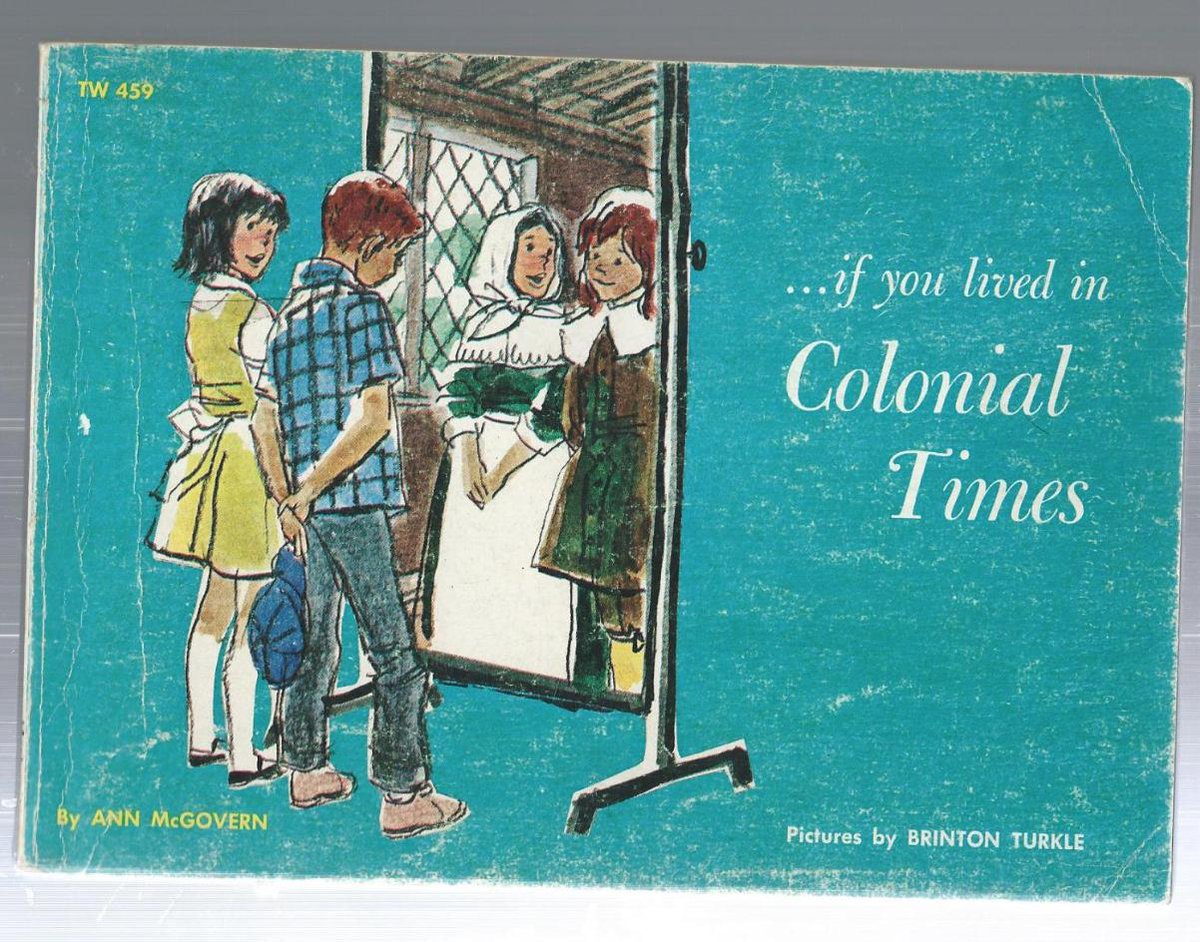On the last day of Black History Month, children at a predominantly African American elementary school in D.C. were each given a book to keep.
The title given to the daughter of one of our Teaching for Change staff was If You Lived in Colonial Times (Scholastic, 1992). While this outrageous book all but erases African Americans and demonizes Native Americans, it ironically came along with an “I am Black History” bookmark.Their review included the book cover. I shared their review on Twitter, but used my own image of the cover. For some books, I'll place a red X on the cover. It is eye-catching and communicates that the book has significant problems.
In their review, they shared some pages from the book. Here's the last page, about who wanted to live in New England. See the last paragraph?

I did a bit of research as I shared their review. They note it first came out in 1964. I found the cover of that first printing:

From what I'm able to see online, the words in the 1964 edition (with pictures by Brinton Turkle) are the same as those found in the 1992 edition, when the illustrations were re-done by June Otani.
What, I wonder, was the conversation that took place in Scholastic offices, in 1990 or 1991 when they discussed updating the illustrations. Obviously they decided they needed to update those illustrations--but what about the words? Did they think those were ok?
Social Justice Books shared part of page 65, about mail delivery:
Sometimes the letter was never delivered. The man you hired might be killed by some Indians.Regular mail service began in 1672, the text reads, when "post riders" were hired:
The post rider rode with the mail through forests, along narrow Indian trails, and across streams. He kept his gun loaded. There might be a hungry bear or wolf nearby. Or an unfriendly Indian.In this moment in the US, with so many news stories of Native and People of Color being shot and killed, I find that passage chilling. And it is missing so much. Why, for example, might a Native person be "unfriendly"? Might it be because people had invaded his land and killed his family?
Why, Scholastic, do you keep this book in print?
Part of the work I do with Teaching for Change is its #StepUpScholastic campaign. Many of you reading this post have fond memories of your school days, when your teacher would hand out a flier of books you could get at a reduced rate. Studies have shown that, today, the selection of books offered is lacking in diversity. We created a webpage through which you can write to Scholastic to ask them to make the selections in the book fliers more diverse, but you can use it to write to Scholastic about any book that you see and have concerns about. If You Lived in Colonial Times is definitely one of those books that is generating concern.
Again: why, Scholastic, do you keep this book in print?
Your brand--your profile--is that your books are educational. With this book, you are not educating children. You are, in fact, hurting any child who reads this book.
Once I hit publish on this post, I'm going over to the Teaching for Change page to submit a comment. I hope you (teachers, parents, librarians) do so, too.


2 comments:
And don't forget Ann McGovern's other bad book, If You Lived with the Sioux Indians, which is reviewed in Through Indian Eyes. That other McGovern book only talks about the Sioux in the past tense, and "makes nonsense" of the holy Sun Dance, as if its practitioners were "barbaric—and silly". It even plays up the yuck factor when discussing Sioux cuisine: "You would even drink the blood of buffalo!"
Thank you for putting this resource together! This has had a direct positive impact on my teaching, as I will NOT be using any of the books from this series in my classroom. This resource means I can look books up myself instead of taking up the time and energy of my coworkers of color by asking for advice about materials.
Post a Comment